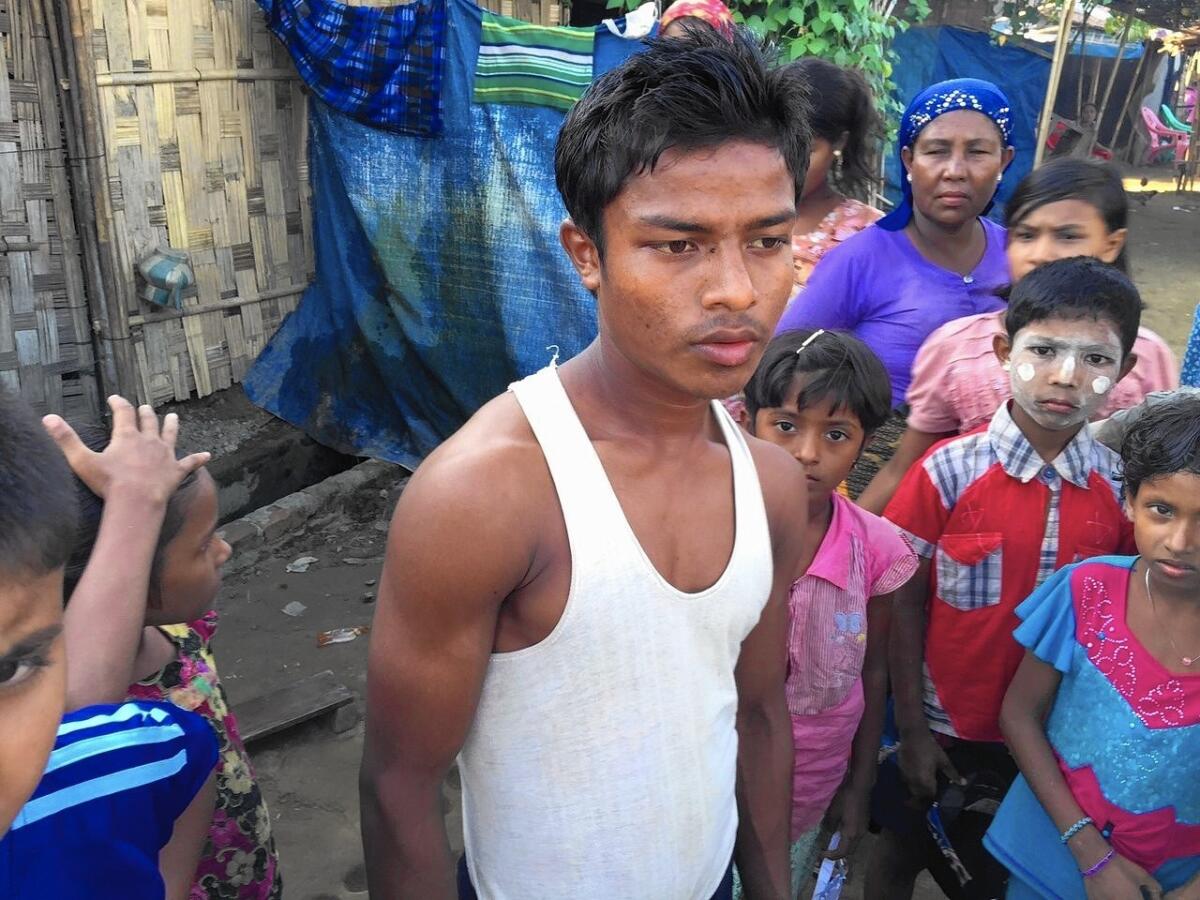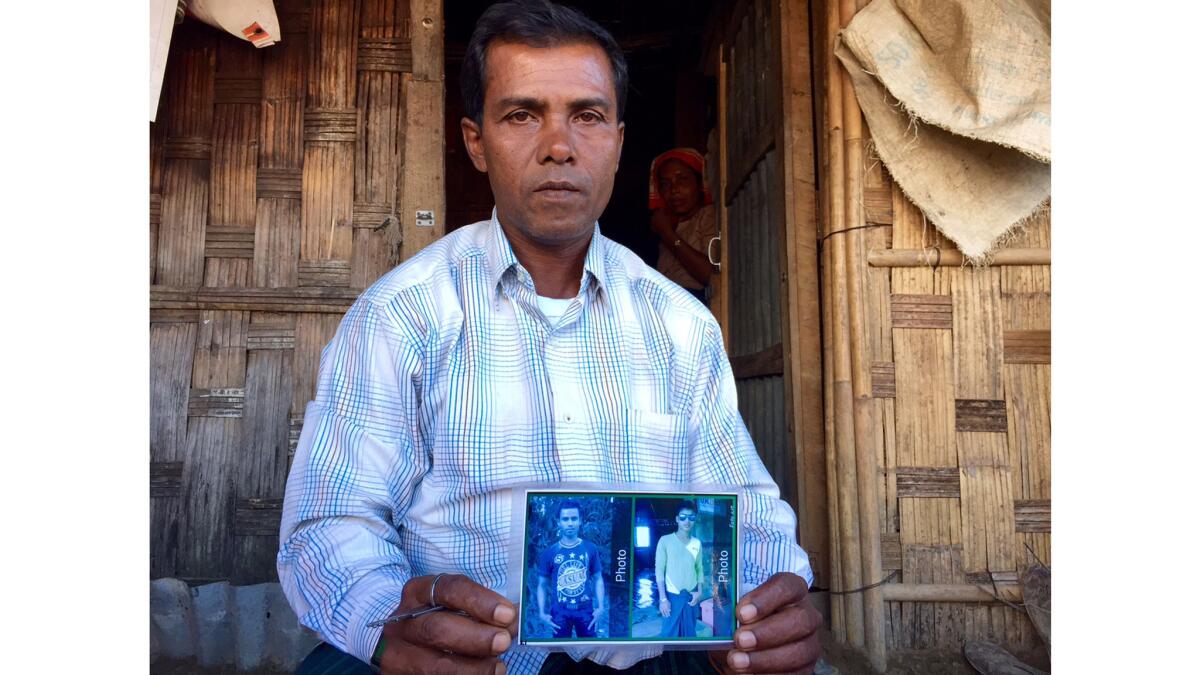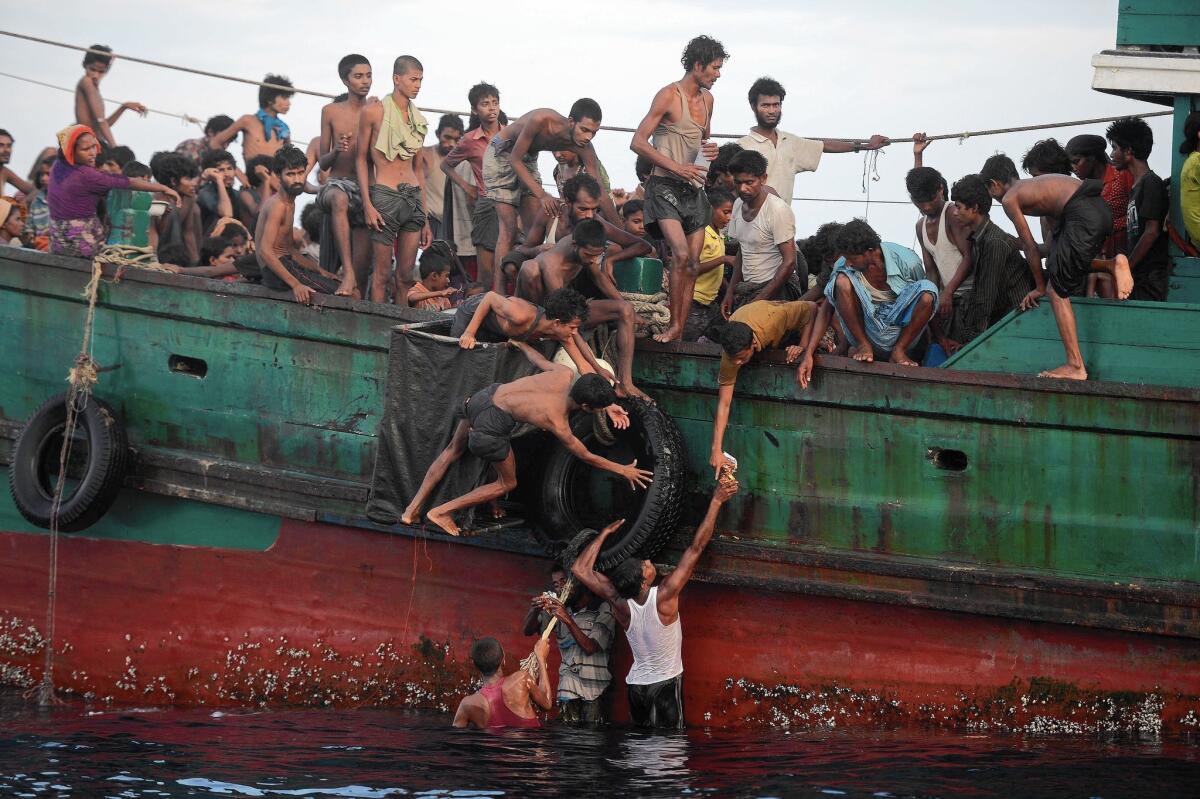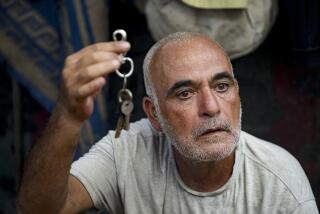Great Read: In Myanmar, a young Rohingya dreams of leaving despite foiled boat journey

Reporting From Thet Kae Pyin Camp, Myanmar — He was small for his age — still a boy, really, with spiked hair and pimples speckled across his cheeks. He looked even smaller in a pair of oversize flip-flops, curling his toes so they didn’t slip off.
School was never his thing. Back before his home was bulldozed and he was displaced in his own country, Mohammed Ayuf spent most of his time in the market where his family owned a grocery, frying up samosas to sell for pennies apiece.
At this camp, his days assumed a routine: wake up, pray at the mosque, return to his family’s hut. Most nights he slept outdoors on the hard earth, swatting hopelessly at flies.
The 16-year-old began talking about leaving, like his older brother two years before and tens of thousands of other ethnic Rohingya Muslims who have braved a perilous sea crossing to escape crushing oppression in predominantly Buddhist Myanmar.
In phone conversations from Malaysia, his brother admonished Ayuf not to try to join him.
“The journey is dangerous,” he told him, “and if you survive, it doesn’t get easier.”
One night this spring, Ayuf announced that he was going to visit his mother, who had fallen sick and was staying with relatives in a nearby village. Instead, he set off in the opposite direction, toward the place the smugglers had described.
Before leaving he picked up three packets of samosas, promising the shopkeeper he would pay later. He walked north along the Bay of Bengal, across paddy fields bathed in ghostly gray moonlight, until he reached a desolate beach where a boat was waiting for him.

Rohingya Muslims in Myanmar.
::
The exodus of Rohingya from Myanmar this year has produced a catalog of horrors: abuse and exploitation by traffickers, grim working conditions in hostile foreign lands and the deaths and disappearances of untold numbers at sea. United Nations refugee officials estimate that more than 1,100 people have died in illicit boat journeys in Southeast Asia since 2014. Hundreds more remain unaccounted for.
Yet for many Rohingya — often described as the world’s most persecuted minority group — the lives they leave behind are worse.
On a low, sweltering peninsula along Myanmar’s western coast, rows of bamboo huts, small and cube-shaped, unfold toward a forbidding sea. More than 100,000 Rohingya live here in temporary camps such as Thet Kae Pyin, where they in effect have been imprisoned since the eruption of anti-Muslim violence in 2012.
See more of our top stories on Facebook >>
Rohingya here in the western state of Rakhine have suffered decades of grave discrimination by a military government and Buddhist majority that view them as dangerous outsiders. The government has stripped them of citizenship, confiscated their lands, restricted their movement and enforced laws aimed at keeping Rohingya families from having more than two children.
Nearly all 1 million Rohingya were barred from voting in last month’s elections in Myanmar, a milestone in the country’s transition from five decades of military rule.

Shafiq Ahmed, 43, in front of his hut in Thet Kae Pyin camp, Myanmar, holds a picture of his sons. The family was chased out of its hometown by Buddhist mobs and government forces.
Myanmar’s government claims the Rohingya migrated illegally from Bangladesh — officials refer to them pejoratively as “Bengalis” — even though some scholars trace the group’s roots in the country to the 12th century. Hard-line monks depict the Rohingya as dark-skinned invaders bent on destroying the country’s Buddhist character.
“We are not ready to live among these Bengalis. Our people cannot trust them,” said U Ohattama, a young, slender monk in the Rakhine state capital, Sittwe.
“If they want to leave the country, that is their choice.”
Ayuf’s grandparents were born in Rakhine before World War II. His father, Shafiq Ahmed, 43, was raised in Sittwe, a centuries-old port on the Bay of Bengal that had dozens of mosques and Islamic schools. Ahmed started a small grocery business in a sprawling, thatch-roofed market in Narzi, a predominantly Rohingya area in the center of town.
In June 2012, reports began circulating in Sittwe that a Buddhist woman had been raped by a group of Rohingya men. Buddhist mobs set fire to Rohingya neighborhoods, killing hundreds and forcing more than 125,000 people to flee their homes.
As the crowds surrounded Narzi, Ahmed said, he raced to salvage items from his shop but soldiers stopped him.
“They said they would shoot us if we carried anything,” said Ahmed, a tall, gentle man with weary eyes. “We left with only the clothes we were wearing.”
Their house was still standing when they left, but Ahmed and his family would not see it again. Buddhist residents and state security forces bulldozed all of Narzi, in effect obliterating the city’s Muslim heritage. In downtown Sittwe, a destroyed mosque lies by the roadside shrouded in weeds, its arched doorways and carved stone columns charred and peeling, as residents cycle past without giving it a glance.
::
Corralled into Thet Kae Pyin, about 1,000 Rohingya families subsist on United Nations rations of rice and beans. Ahmed, his wife and four sons squeezed into a one-room hut surrounded by an open sewer.
Not long after the bloodshed in Sittwe, Ahmed’s oldest son, Mohammed Fayaz, began planning his escape. Springtime, when the waters are quiet before the monsoon rains, is prime smuggling season. One night in mid-2013, Fayaz boarded a boat in the hope that he would reach Malaysia and find a job.
The family knew nothing of Fayaz’s plans — until he called from a jail in Thailand. He had been arrested for entering the country illegally.
He spent 11 months locked up before the family managed to borrow $2,000 to secure his release. Another group of traffickers spirited him into Malaysia, where he is slowly working off the debt at a steel mill.
Like most of the Rohingya who have fled Myanmar by boat, Fayaz, now 23, does not have refugee status in his new country. He lives in a ghetto for undocumented workers, in fear of Malaysian police who could arrest or deport him at any moment.
Fayaz’s departure shocked the boys’ mother, Amina. She spent days lying on the dirt floor of the hut, paralyzed with worry. Even now, when Fayaz calls, she can’t bear to bring the phone to her ear.
This year, when Ayuf began talking about leaving, Amina was bedridden again.
“I’ve already lost one son,” she said. “I don’t want to lose another.”
::
Ayuf’s plan was simple: If he got to Malaysia, he could get a factory job like his brother. If that didn’t pan out, he could start making samosas again.
“My mind was just focused on how I could make some money and help the family,” he said.
The night he escaped, smugglers ferried Ayuf and about 16 others on a small fishing boat out to sea, then herded them onto a much larger vessel with hundreds aboard. Most were Bangladeshi migrants, he recalled, but there were also pregnant women and children.
One smuggler wrote an identification number on Ayuf’s arm and ordered him to lie on the dirty floor of the boat, apparently to escape detection by passing ships. Anyone who disobeyed risked being beaten with a metal chain or burned by a cigarette, he said.
Once Ayuf stood up at the wrong time and a smuggler set upon him with a knife, slicing three small cuts into his left forearm.
For nearly two weeks, Ayuf said, they remained at sea as the boat collected more passengers. They were given a few spoonfuls of rice each day, sprinkled with chili powder.
In early May, dozens of corpses — believed to be those of Rohingya — were discovered in the Thai jungles along the Malaysian border. In response to worldwide outrage, Southeast Asian countries announced a belated crackdown on trafficking. When Malaysian authorities began interdicting boats carrying migrants, the news quickly reached Ayuf’s ship. The smugglers called off the operation and set course to return to Myanmar.
“They said it wasn’t a suitable time, and they would arrange another trip later,” Ayuf said.
Back on land, the smugglers demanded $200 from each passenger. When Ayuf couldn’t pay, he was handed over to the police near Sittwe. Ayuf was surprised to see the smugglers and Myanmar police working so closely together, but before he could find out more, his father had found him and arranged for a loan to bail him out.

::
Sitting at a snack shop a stone’s throw from his hut, Ayuf recalled his abortive journey. His story drew the attention of a few young men who were idling away the warm afternoon watching an old Bollywood film on a tiny TV.
Someone asked whether he would leave again. Ayuf smiled.
“All I do is think about the future,” he said. “There’s nothing to do here but go to the mosque.”
The springtime smuggling season is approaching. Ayuf’s father suspects he and his friends are plotting another escape.
Amina clutched an orange scarf wrapped across her hair and looked weakly at her son, his toes tracing lines in the dirt.
“If people start leaving again by boat,” she said, “he will follow.”
Twitter: @SBengali
MORE GREAT READS:
Artist Lydia Emily faces down death to spread her light
A night of violence that shattered a South African’s view of her white privilege
‘Miss Kay,’ broken by loss, finds love and care at life’s end
More to Read
Sign up for Essential California
The most important California stories and recommendations in your inbox every morning.
You may occasionally receive promotional content from the Los Angeles Times.











